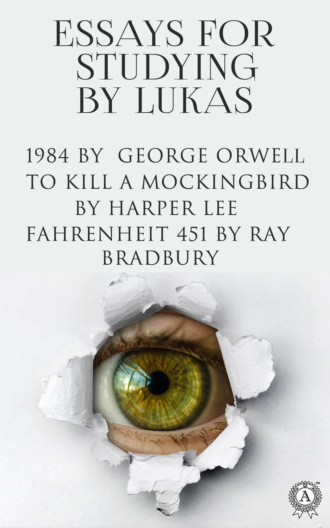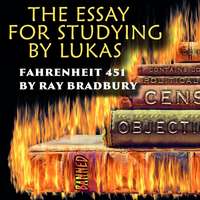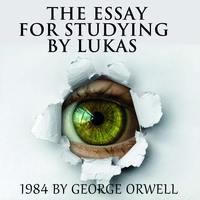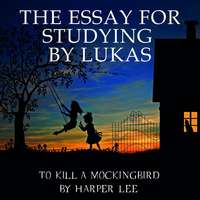
Полная версия
Essays for Studying (1984, To Kill a Mockingbird, Fahrenheit 451)

Essays for Studying
by Lukas
Nineteen Eighty-Four (1984) by George Orwell
To Kill a Mockingbird by Harper Lee
Fahrenheit 451 by Ray Bradbury
George Orwell. Nineteen Eighty-Four (1984)
The essay for studying by Lukas
About the authorEric Arthur Blair, who is more famous all around the world under his pen-name George Orwell, was born more than one hundred years ago, on 25 June 1903 in the town Motihari, British India in a family of an employee of the Opium Department of the Indian Civil Service.
The iconic story Animal Farm and the novel 1984 are his brightest works written in the anti-utopian genre that flourished in the 20th century. The pioneer of the anti-utopia is considered to be a Russian writer Yevgeny Zamyatin, whose novel We influenced on the Orwell’s works and not less famous Aldous Huxley, the author of Brave New World. And what is more, it was Orwell, who came up with an expression the Cold War.
The father of a future writer held a position as if from the pages of a novel about the totalitarian hierarchic society, “the assistant of the senior manager’s junior deputy of the Opium Department”. That is why he could not provide his offspring with an expensive education. However, Eric Arthur Blair due to his abilities and determination managed to win a scholarship in Eton.
After graduating from the college, he served in the colonial police in Burma and tried to write in the genres of political journalism and fictional prose. Before he turned 30, Eric Arthur had lived on casual earnings, until he came to Paris, where his first, autobiographic story Down and Out in Paris and London, written under the pen-name George Orwell, was published.
His pen-name appeared not because he wanted to show off, but because it was necessary – his relatives did not share his left views.
The history of a pen-name is very simple: Orwell is the name of a small English river, and George is one of the most popular British names.
Later, for half a year the writer together with his wife fought in the war for the Left at the Aragon Front in the Spanish Civil war, he was injured in the neck by a frank sniper in Uesca.
Here his views suddenly changed. Orwell began to hate the policy of Stalin because he considered him to be an epitome of evil.
Orwell’s contemporary, a socialist Kingsley Martin, the editor of the New Statesman, wrote that Orwell looked at the USSR bitterly, with the eyes of a revolutionist disappointed in his child, and thought that the revolution in the Soviet Union had been betrayed.
During the Second World War, Orwell wanted to enlist in the army, but, because of the health condition (he had tuberculosis), he could not. He hosted an anti-fascist program on BBC.
Orwell is also famous for hot-blooded criticizing of the existed in the USSR regime. In the essay Why I Write (1946), Orwell pointed out: “Every line of the serious work that I had written since 1936 was directed, directly or not, against the totalitarianism and for the democratic socialism as I understand it.” Orwell sharply condemned Western authors, who identified socialism with the Soviet Union, in particular, George Bernard Show. Orwell was convinced that the countries which were going to build the socialism should not try to follow the Soviet Union, but, first of all, be afraid of it.
What would Orwell say about the modern digital information democracy where every person, like in the Book of Daniel, “is counted, weighed and considered”?
The most famous and scandalous event in the writer’s life after the war was making the Orwell’s list.
In 1949, Celia Kirwan, to whom Orwell had proposed not long before, asked him to recommend someone for a position in the Information Research Department of the Foreign Office. The unit’s role was to counteract the Soviet propaganda; Orwell denied to work there, but recommended a couple of people. Orwell also offered to make a list of people who should not be considered as unit’s employees because of their sympathies for the USSR and the Communism. From his personal notebook, which contained contact details of 135 people, including B. Show, J. Steinbeck, J.B. Priestley, C. Chaplin and others, Orwell chose 38 and passed them to Celia. Some of them he qualified merely by intuition as secret Soviet spies, but he was right, for example, the head of the Russian Unit in the Information Department, Peter Smollett. The Orwell’s list was published about 50 years after the writer’s death, Orwell’s gesture provoked disputes, and his ill-wishers tried to use it to compromise the reputation of Orwell.
On 21 January 1950, the writer died from tuberculosis.
Two whales of the Orwell’s heritageThe anti-utopian parable or satiric story Animal Farm is an allegory of the Revolution of 1917 and the following events in the USSR. It shows the transformation of supposedly animal society: from the complete freedom after the cruel former owner, Mr Jones was banished to the dictatorship of the boar, Napoleon.
The animal farm lives according to the Animalism (mockery of the Communism).
The Animalism is based on the seven commandments that were invented by pigs and which they painted at the sidewall of a big barn:
1. Whatever goes upon two legs is an enemy.
2. Whatever goes upon four legs, or has wings, is a friend.
3. No animal shall wear clothes.
4. No animal shall sleep in a bed.
5. No animal shall drink alcohol.
6. No animal shall kill any other animal.
7. All animals are equal.
The twisted seventh commandment of this parable became a catchphrase: “All animals are equal, but some animals are more equal than others.”
It appeared because many dwellers of the Animal farm due to their limitations were unable to remember all seven commandments, that is why, especially for them it was decided to shorten the regulations of the Animalism to a simple maxim “Four legs good, two legs bad. Later, the pigs, that stopped following the rules but did not stop propagandizing them among other animals, secretly changed them so they would not be accused of breaking these rules. When the pigs started walking on two legs, the maxim was eventually changed into: “Four legs are good, but two are better!”
The evident satire on the Soviet Union, a British ally in the anti-Hitler coalition of that time, was published after the defeat of Germany, in August 1945.
Конец ознакомительного фрагмента.
Текст предоставлен ООО «ЛитРес».
Прочитайте эту книгу целиком, купив полную легальную версию на ЛитРес.
Безопасно оплатить книгу можно банковской картой Visa, MasterCard, Maestro, со счета мобильного телефона, с платежного терминала, в салоне МТС или Связной, через PayPal, WebMoney, Яндекс.Деньги, QIWI Кошелек, бонусными картами или другим удобным Вам способом.




